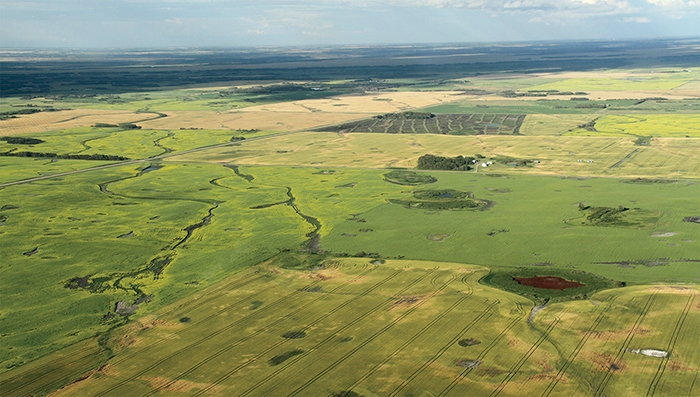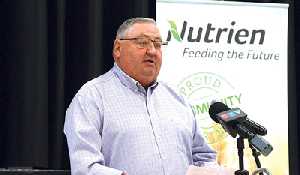Agriculture industry working through COVID-19
April 4, 2020, 5:31 am
Rob Paul Local Journalism Initiative Reporter


Confirmed cases of COVID-19 in Canada continue to grow as more and more precautions are being taken.
Saskatchewan, Alberta, British Columbia, Ontario, New Brunswick, and Nova Scotia have all declared provincial states of emergency to combat the spread of the virus.
Businesses throughout Canada have either had to make major adjustments to promote social distancing or they’ve had to close all together.
One industry that cannot shut down during the COVID-19 pandemic is the agriculture industry.
The Agricultural Producers Association of Saskatchewan (APAS) recently put out a statement saying Saskatchewan farmers will continue to work through this time.
“Saskatchewan farmers are not shutting down,” said APAS President Todd Lewis. “Farm families are hard at work every day to ensure stable supply of quality food for Canadian and international customers.”
APAS also said they will need government support during the COVID-19 crisis to continue to produce at their highest level.
“People around the world will continue to rely on our products, and we will continue to operate while other sectors slow down,” said Lewis. “However, as an industry that supports one in every eight Canadian jobs, farmers need assistance from governments and industry partners to make sure we can continue to do our jobs.”
“Our members are about to invest billions of dollars into this year’s crop, and recent weather, trade, and transportation disruptions have stretched our financial capacity to the limit. We need the government and financial industry to assist us to make that investment possible,” said Lewis.
Prime Minister Justin Trudeau announced last week that there will be $5 billion credit program to support farmers that will go to Farm Credit Canada (FCC) to boost its lending capacity.
“While much of the Canadian economy has shut down, Saskatchewan farmers are getting ready to put in this year’s crop, and they need to know that credit is available to allow them to seed,” said Lewis.
“This announcement is a good first step to help spring feeding move forward.”
APAS is pleased with the government supporting agriculture, but wants more to be done.
“Our net farm incomes have dropped by over 40 per cent in the last two years, and many farm operations have been impacted by low commodity prices, poor weather, and trade and transportation disruptions,” said Lewis.
“With COVID-19 we are now facing unprecedented business instability going into the 2020 production year and our Business Risk Management programs do not provide us with an adequate financial backstop needed to manage these risks.
“We need further measures to ensure that we have the cash flow and financial means needed to produce food for Canadians and for export customers,” said Lewis.
With the border closures, APAS has voiced their concerns about a lack of workers because of the non-Canadians many in the agriculture community employ.
“Many producers have relied on international seasonal labour to do essential work on Canadian farms, but it appears that workers may not be available this season due to border closures. People that have lost their jobs during the COVID-19 crisis need to be connected to agricultural work that urgently needs to be done,” said Lewis.
“APAS and other agricultural groups need to engage with everyone that can help connect potential workers with employment opportunities.”
APAS is also worried about potentials supply chain issues due to COVID-19 and believe it’s something that will need to be addressed.
“Whether it is transport of products to export markets, or availability of farm inputs or processing capacity, Canadian farmers depend on a fully functional transportation and supply chain. For the sake of maintaining a stable food supply globally, we all have to ensure there are no further disruptions to Canadian agriculture.”
APAS President Todd Lewis told the World-Spectator that the most important thing for the agriculture industry is to keep the transportation corridors open.
“Doesn’t matter if it’s going to be crops or livestock to export position across the U.S. border or to tidewater, that’s important” said Lewis. “Also that the same corridors remain open for inputs like fertilizer, machinery parts, or anything else producers have.”
“We’re in a busy time of year with spring seeding and it’s going to be important we have a good supply of what we need to get the crop in,” said Lewis. “On the livestock side the processing side is going to be important to ensure our processors are able to run efficiently.”
Lewis says the federal government is already stepping up to help answer some of the biggest questions around the agriculture industry during the COVID-19 situation.
“There are lots of question around credit,” said Lewis. “The federal government put $5 billion towards capital needs within agriculture and that’s important.”
“It’s important that we see that credit’s available, the federal government has done a number of moves there to make more money available to the financial system and we want to make sure that money is available for agriculture.”
“The governments, both provincial and federally, have shown they recognize the importance of agriculture and it’s going to be one of the few industries in the country that won’t see a drop in demand,” said Lewis.
With many other industries stopping or slowing down due to COVID-19, Lewis says there will be more opportunities for work in agriculture.
“There’s going to be lots of opportunity in agriculture,” said Lewis. “It seems like there are lots of unemployed and underemployed people that agriculture can offer job opportunities to going forward into the upcoming growing season.”
Even with the unknown that is coming going forward during COVID-19, Lewis remains positive and says the agriculture industry will get through this.
“It’s going to get worse before it gets better, but with good planning producers will get through this as best we can,” said Lewis. “We’re a pretty resilient bunch in the province and we’ve seen some good leadership at the provincial level.”
Grain farmer Craig Roy says the biggest impact COVID-19 could have on him is if he gets sick.
“If I can’t work during seeding than that’s a problem,” said Roy.
Roy says that’s probably the main worry for most farmers.
“Not being out there when we need to be out there would be a major disruption,” said Roy.
Moosomin grain farmer Mark McCorriston says COVID-19 hasn’t affected him yet, but he’s concerned what will happen if he gets sick.
“It hasn’t impacted me yet, but the procedures for selling grain are a little bit different now,” said McCorriston. “Everything is done via text or on the phone.”
“It puts a little bit more stress on your plate, but the impact hasn’t happened yet,” said McCorriston. “I would think it would be more in the coming weeks that we have to deal with the impact of it.”
“In the beginning of the COVID-19 scare, grain prices tanked, but they seam to be coming back up,” said McCorriston. “The scariness around COVID-19 is more as we get into seeding.”
“My biggest concern is if I got it myself, I’m the business owner, I run the air seeder, and if I wasn’t able to run the air seeder, that’s my biggest fear,” said McCorriston.
“You don’t really know when you do get it what to expect for symptoms, sometimes it’s a runny nose and a headache and then on the news you see it’s respiratory problems and weakness,” said McCorriston. “It’s a little bit of a scary situation.”
McCorriston says with the amount of traffic that comes through Moosomin from all over the country, COVID-19 will spread here at some point.
“Being in Moosomin, we’re going to get it I feel like,” said McCorriston. “I farm right beside number one highway and you think about the transport traffic coming from British Columbia and southern Ontario, those people are passing through Moosomin, eventually a truck driver will bring it to our town. It’s only a matter of when.”
As COVID-19 continues to spread in Canada, McCorriston worries that it will have a negative impact on farmers ability to acquire the supplies they need during seeding.
“Once the farmers go to the field we need a lot of diesel fuel, liquid fertilizer, and granular fertilizer,” said McCorriston. “So if COVID-19 spreads to the refinery and you’re halfway through seeding and Co-op says they can’t deliver diesel, then what do you do?”
“Some farmers are talking about buying more fuel tanks and trying to store more fuel on the farm,” said McCorriston “The other side is, the longer you hold on right now to buy your diesel, the cheaper it’s going to be because oil is plummeting.”
“There’s hysteria that if they don’t fill their tanks now then they might not get it filled so they’re forcing themselves to pay more money for their spring diesel then they have to.”
“My biggest concern would be if I got sick myself and couldn’t operate my air seeder or if we couldn’t get the supplies we need to put the crop in,” said McCorriston.
McCorriston doesn’t think the government will give the agriculture industry enough extra support during this crisis.
“In all honesty I don’t think the Liberal government really cares about the farmers in western Canada or the oil patch workers,” said McCorriston. “The oil patch workers are off and lots of those guys won’t have a job to go back to when the industry starts up in June or July again.”
“I don’t anticipate any help from the Liberal government for our grain farmers or for our local oil patch workers.”
For now, McCorriston says the overall impact is unknown with a situation they’ve never seen before, but there’s no shortage of concern.
“Optimism in agriculture has definitely dwindled over the last eight or nine months,” said McCorriston. “There are concerned farmers that are nervous about getting their fertilizer and diesel when they need it and we’re all in the same boat because we don’t know what to expect with COVID-19.”



































